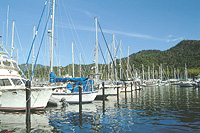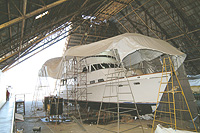|
Trinidad & Tobago is an unusual outpost in the western hemisphere—despite being a developing country, it has a throbbing economy and has considerable influence in its neighbourhood. While its Caribbean and South American neighbours move between free market policies and socialist models, T&T has been remarkably stable and the government is totally focused on taking the economy further.
 So when you think of Trinidad and Tobago and have visions of rum and cola, just remember that the country isn’t really dependent on tourists. In fact it is the oil and gas industry that has been the most important in Trinidad & Tobago for some time. It had been in long-term decline from the 1980s due to falling yields and low world prices. So when you think of Trinidad and Tobago and have visions of rum and cola, just remember that the country isn’t really dependent on tourists. In fact it is the oil and gas industry that has been the most important in Trinidad & Tobago for some time. It had been in long-term decline from the 1980s due to falling yields and low world prices.
More recently, however, new discoveries, increased foreign investment and a steady increase in world prices have reversed the trend. In the summer of 2003, Trinidad signed a landmark agreement with nearby Venezuela, one of the world’s largest producers, to collaborate in all aspects of the oil and gas industries. Apart from oil and gas, Trinidad has the world’s largest deposits of asphalt.
The non-oil industrial sector is concentrated in relatively new industries established with oil and gas revenues, such as plastics and electronics. The agricultural sector is small, with sugarcane, coffee, cocoa and citrus fruits as the main commodities. Once a net exporter of foodstuffs, Trinidad now imports the bulk of its requirements.
 T&T has also sought to address historic under-investment in the tourism industry, a promising part of the economy which has undergone steady growth. The islands now cater to about 400,000 visitors annually; the industry is worth about US$275 million. T&T has also sought to address historic under-investment in the tourism industry, a promising part of the economy which has undergone steady growth. The islands now cater to about 400,000 visitors annually; the industry is worth about US$275 million.
T&T formerly had the most heavily regulated economy in the region but the state-controlled edifice was dismantled during the 1990s as part of an IMF-approved package of privatisation, fiscal and trade liberalisation. Trinidad & Tobago is a member of the Caribbean trading bloc,
CARICOM.
Overall, T&T has earned a reputation as an excellent investment site for international businesses. Successful reforms implemented in 1995 set economic growth on a roll, and foreign investment and trade flourished. Unemployment has decreased to its lowest point in years. The country enjoys a healthy trade surplus.
|
T&T FACT
FILE
- T&T is seeking to reduce its dependence on the
energy sector.
- Total FDI has averaged $700 m annually over the last decade.
- There are no currency or capital controls by the central bank.
- The industrial production growth rate is about 17 per cent.
- Expansion of the Crown Point airport in Tobago is being planned.
- Major food produce includes cocoa, rice, citrus fruits, coffee, vegetables, poultry.
|
A MATURING ECONOMY
Trinidad and Tobago has made a transition from an oil-based economy to one based on natural gas. Natural gas production averages over 3 trillion cubic feet per day (tcf/d). The petrochemical sector, including plants producing methanol, ammonia, urea, and natural gas liquids, has continued to grow in line with natural gas production, which continues to expand and should meet the needs of new industrial plants coming on stream in the next few years.
 A major development has been the opening of the fourth production module or "train" for liquefied natural gas (LNG) at Atlantic LNG. Train 4 increased Atlantic LNG overall output by almost 50 per cent and was one of the largest LNG train in the world at 5.2 million tons/year of LNG. Trinidad and Tobago is the fifth largest exporter of LNG in the world and the single largest supplier of LNG to the US, supplying 70-75 per cent of all LNG imported into the US. Overall, the petroleum sector grew by 10.5 per cent in 2004, the third straight year of double-digit growth. A major development has been the opening of the fourth production module or "train" for liquefied natural gas (LNG) at Atlantic LNG. Train 4 increased Atlantic LNG overall output by almost 50 per cent and was one of the largest LNG train in the world at 5.2 million tons/year of LNG. Trinidad and Tobago is the fifth largest exporter of LNG in the world and the single largest supplier of LNG to the US, supplying 70-75 per cent of all LNG imported into the US. Overall, the petroleum sector grew by 10.5 per cent in 2004, the third straight year of double-digit growth.
The PNM-led government has continued the sound macroeconomic policies of the previous UNC government. Long-term growth looks promising, as Trinidad and Tobago further develops its oil and gas resources and the industries dependence on natural gas, including petrochemicals, fertilizers, iron, steel and aluminum.
Additional growth potential also exists in financial services, telecommunications and transport. Strong growth in Trinidad and Tobago over the past few years has led to trade surpluses, even with high import levels because of industrial expansion and increased consumer demand. The debt service ratio, 15.4 per cent in 1997, fell to as low as 3.7 per cent in 2001 and was a moderate 4.7 per cent in 2004.
There are no currency or capital controls and the central bank maintains the TT dollar in a lightly managed, stable float against the US dollar.
Manufacturing has grown by leaps and bounds and the construction sector has seen growth due mainly to the Trinidad and Tobago government investment in housing and infrastructure, and ongoing projects in the energy sector. There has also been a restructuring of the sugar industry.
Recognising the role that energy plays in the economic life of Trinidad and Tobago, where it was the source of at least a third of governmental revenues, the Government is seeking to diversify the economy to reduce dependence on the energy sector and to achieve self-sustaining growth. The diversification strategy focuses on six main sectors: traditional manufacturing, a new technology-based industrial sector, tourism, financial services, agriculture and small business.
INVESTMENT CLIMATE
The investment climate is good. Since 1992, almost all investment barriers have been eliminated. The Government continues to welcome foreign investors. The Government has a double taxation agreement, a bilateral investment treaty and an intellectual property rights agreement with the United States. American investment in Trinidad and Tobago exceeds a $1 billion.
Total foreign direct investment (FDI) has averaged $700 million annually over the last decade. Among recent and ongoing investment projects are several involving U.S. firms: ISG Trinidad started operations in November 2004 in a plant that has the capacity to produce 500,000 metric tons annually of hot briquetted iron. Nucor has received approval from the Trinidad and Tobago Government to set up a plant to produce up to 1.5 million tons annually of direct reduced iron. Two aluminum smelter plants are also planned, one of them to be owned by ALCOA.
The first major business-class hotel to be opened in several years bears the Marriott Courtyard brand. Hyatt has announced plans to manage a property at the multimillion-dollar port development project in Port of Spain.
Trinidad and Tobago’s infrastructure is adequate by regional standards. Expansion of the Crown Point airport in Tobago is being planned, which follows opening of the Piarco terminal on Trinidad. There is an extensive network of paved roads. Traffic is a bit of a worry as the booming economy makes people go for more and more cars. Trinidad and Tobago has to look at a mass transport system as an alternative.
 Utilities are fairly reliable in cities, but some rural areas suffer from water shortages, power failures, and inadequate drainage. Infrastructure improvement is one of the Government’s budget priorities, especially rehabilitating rural roads and bridges, rural electrification, flood control and improved drainage and sewerage. A multi-year plan for light rail transport has been announced. Utilities are fairly reliable in cities, but some rural areas suffer from water shortages, power failures, and inadequate drainage. Infrastructure improvement is one of the Government’s budget priorities, especially rehabilitating rural roads and bridges, rural electrification, flood control and improved drainage and sewerage. A multi-year plan for light rail transport has been announced.
MAKING A CONNECTION
Telephone service is modern and reliable, although significantly more costly to consumers than comparable U.S. services, including for wireline, wireless and broadband services. Change began this year in the wireless market when the new Telecommunications Authority invited two firms to offer competition to state-owned monopoly incumbent TSTT (co-owned by Cable & Wireless).
Long-distance, cable and internet services have not yet been deregulated, but the Government has indicated that it will do so in those markets as well, beginning with cable TV. Internet has come into widespread use, but broadband services are limited to a few upscale residential areas, although some wireless "hot spots" have emerged. Improvements in service and price are likely as TSTT prepares itself to meet competition for Internet services in coming years.
|